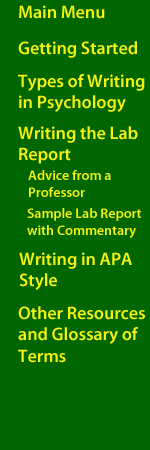

Sample Lab Paper with Commentary
(printable version here)
By Melanie Cooke
Now that you've read the basics of constructing a lab report, you're ready to write your own! If any of the information above is unclear to you, look at this sample lab report for further guidance. You can read the teaching fellow's and professor's commentaries, as well as the writer's reflection on how she could have improved her lab report. Remember, you can always ask any teaching fellow for help!
Teaching fellow's comments - Red
Profesor's comments - Blue
Writer's comments - Green
[1] In APA style, text is always Times New Roman.
[2] Don't use "etcetera." Be specific.
[3] Should cite this fact from Wang, Peterson and Morphey (2007)
[4] Redundant
[5] 2007
[6] Use "and others" when outside of a parenthetical citation
[7] This sentence is redundant. Citation should read "(Wang et al., 2007)"
[8] Good!
[9] Specify why that might be - long-term influences are perhaps more important in young adulthood?
[10] Although older participants indicated less preference to spend time with friends more than peers than younger participants, this relationship was not significant.
[11] Try breaking up this sentence into smaller sentences to make it easier to read
[12] Is the prediction or the result supported by our results?
[13] Redundant
[14] This was confusingly written
[15] Saying something this definitive should have a citation
[16] Good research implications?
Professor's Commentary
[1] The grader notes that one should use "and others" when outside of a parenthetical citation. While technical formal style agrees, I don't, and never would put "Wang and others". I would, as you do, cite the paper rather than the authors, and say that "Wang et al. questioned 135...".
[2] It is clear that you are reporting results, so resaying "Their results also supported the claim" is redundant. You can simply say "Parents and peers were judged equivalent sources of influence..."
[3] First, it is incorrect to say that the results "did not support" the hypothesis of a relationship between age and peer influence. Indeed, they did do so, but not strongly enough to reject the hypothesis that there is no relationship. It's better to say that the relationship did not differ statistically from chance. Second, and more importantly, you have a non sequitur in the second sentence of this paragraph. The hypothesis that "as an adolescent ages, the individual becomes less heavily influenced by peers" is not a causal one (time is never itself a cause-causes happen in time), so mentioning that correlation does not imply causation is out of place.
[4] Your discussion of how our sample differed qualitatively from Wang et al.'s, and of how transitioning to college may affect responses, is clear and thoughtful.
[5] I am very confused about the relationship between the results of your reported analysis and Figure 1. Figure 1 shows almost no relation between age and preference for friends over parents (R^2 around .0009, suggesting an R of around -0.03); you report a strong negative correlation of -.6. Why are these result reports so different from each other? Given what I know (and things may have happened in lab that affected this), I would have taken off several points (about 4) in the results section, because of the mismatch between the figure and the conclusions.
Writer's Comments
[1] Many of the comments my TF makes are in regard to specificity, or the lack there of. It took writing a few more lab reports before I realized how I could improve my ability to write concisely and effectively. I've learned to be more direct by constantly rereading my writing to look for any extraneous information or redundancies.
[2] The disagreement between my teaching fellow and professor taught me a valuable lesson. Although rules are made to be consistent, there are always exceptions. A professor's personal preference is one of those exceptions. Learning the pet peeves and nuances of the person grading my work can only occur through experience. This is why rereading my previously graded lab reports is important to me - I wouldn't have known to "fix" my writing if it hadn't been acknowledged.
[3] Writing lengthy sentences has always been a weakness of mine. Because scientific writing is direct and clear, I've learned to write concise, clear sentences. Writing this way has also helped me avoid writing run-on sentences in papers for my other classes.
[4] I copied and pasted the graph from the Excel sheet my teaching fellow sent me without ever actually looking at it. Because this was one of the first lab reports we submitted, our teaching fellows provided us with the graphs (we weren't taught how to calculate the results and construct a representative graph). Even though I wasn't responsible for creating the graph, I still should have looked at it to see if I understood what was being shown. In this case, the graph's inaccuracy was the accidental fault of the teaching fellow. That said, it is my fault for not verifying that the the graph was accurate. If I don't check the graphs sent to me, I'll be less likely to check them when I'm responsible for creating the graph myself.
Other Disciplines | Writer's Web | Writing Center | Make
an Appointment | Library | Department of Psychology
Copyright Info